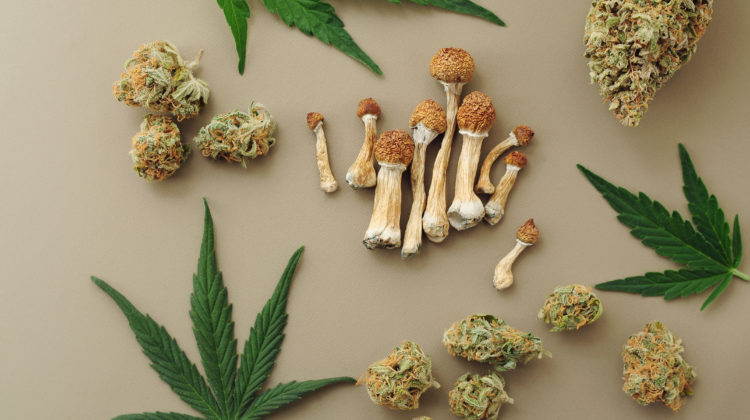
Using Psilocybin to Find Relief
Psilocybin, a compound dating back further than civilization itself, has recently been found to offer relief from mental illnesses such as depression and anxiety. The drug, found in “Magic Mushrooms”, has been villainized by governments across the world for years due to its apparent lack of medicinal use. New evidence has unseated this idea and provided hope for those looking for a more natural treatment for their mental ailments.
In ancient civilizations all over the world, psilocybin was praised and its use encouraged. From the Aztec and Mayan population to the citizens of ancient Greece, the drug was seen as a way to connect with both oneself and surrounding higher powers. The intoxicating effects were touted as a way to spiritually enlighten those willing to give it a try and were highly celebrated in many cultures. In the following years, psilocybin was “rediscovered” by established countries.
For years, continuing research was published on the possible positive effects that psilocybin produces. Unfortunately, some studies went awry; subjects were reportedly forced to participate and positive progress was halted. With the rise of the counterculture movement in the 1960s, it was once again popularized. In 1968, psilocybin was federally outlawed in the United States and labeled a Schedule I drug.
Since the War on Drugs, psychedelic mushrooms have (very) slowly but surely been making a comeback. Several countries, including Brazil, Jamaica, and the Netherlands, have legalized the drug, apparently acknowledging its benefits. As of today, psilocybin is still illegal in all 50 states of America but has been decriminalized for therapeutic benefits in places like Oakland, CA and Oregon, thanks to the Oregon Ballot Measure 109.
What is Microdosing?
According to the Alcohol and Drug Foundation, there are many different fungi containing psilocybin, and they look just like normal mushrooms. In order to feel the effects, “Magic Mushrooms” can be ingested in a number of ways, including being freshly eaten, cooked, or brewed into teas.
The effects of psilocybin are various and enormous. The drug can produce auditory and visual hallucinations, while also “providing profound changes in consciousness”, according to an article published by John Hopkins Medicine. Belonging to the class of psychedelics, psilocybin can change perception, mood, and cognitive processes, all of which have a hand in mental illnesses such as depression and anxiety.
For medicinal purposes, microdosing psilocybin is common. Microdosing is defined as repeatedly ingesting a very low dose of a substance, and is usually considered to be effective after a few weeks. The dose ingested, usually 5-10% of the normal dose, would not produce psychoactive effects, meaning that the typical “trip” these fungi are known for is tamped down in favor of other wanted effects, such as small changes to the emotional areas of the brain.
Complicated Current Treatments
Major Depressive Disorder (MDD) and Generalized Anxiety Disorder (GAD) are two of the most common mental illnesses in the United States, with MDD affecting around 5% of the adult population and GAD affecting around 19%. Common symptoms of MDD include sadness, irritability, and loss of pleasure in normally stimulating activities. GAD is often co-morbid (meaning commonly occurring together) with MDD and is characterized by persistent and excessive worry.
Typical treatments for both MDD and GAD include therapies, such as Cognitive Behavioral Therapy, and medications, such as SSRIs and anxiolytics. SSRIs (selective serotonin reuptake inhibitors) work to alleviate depression symptoms by keeping serotonin, the “pleasure and happiness” chemical, in the brain for longer periods of time. Anxiolytics are commonly prescribed medicines for anxiety disorders, and work to calm the brain by increasing certain protein levels.
While SSRIs and anxiolytics are very prevalent in today’s society, they are habit-forming. This is a problem, as many people are not interested in taking medications that can lead to serious withdrawal or dependence. SSRIs and anxiolytics, while having great potential for treatment, are also very person-specific. This means that not all SSRIs work for every person with MDD and not all anxiolytics work for every person with GAD. Finding the right medicine can be a very time-consuming and arduous process. Hence, some affected by these disorders are beginning to turn to psilocybin for relief. So can mushrooms actually help to reduce symptoms of depression and anxiety? Recent research says yes.
Natural Treatment Efficacy
In a 2020 study entitled “Effects of Psilocybin-Assisted Therapy on Major Depressive Disorder”, researchers administered two doses of psilocybin, along with psychotherapy, to adults with depressive symptoms. The results were groundbreaking – the psilocybin led to “large, rapid, and sustained antidepressant effects.”
These are not stand-alone results – they have been mirrored in several recent studies. John Hopkins Medicine’s Alan Davis conducted a similar study and found that “the magnitude of the effect [they] saw was about four times larger than what clinical trials have shown for traditional antidepressants on the market.”
It turns out that psilocybin works faster and longer with fewer side effects than the typical SSRI or anxiolytic. The chemical found in certain mushrooms actually interrupts brain processes, which allows the brain to reform and shape itself in new ways. This results in the brain becoming more flexible and fluid.
Due to these major benefits of psilocybin, the drug seems very promising for treating symptoms of depression and anxiety. As exciting as this possibility sounds, the drug alone is not a cure – researchers advise that psychotherapy should accompany the ingestion of psilocybin. The body of research on “Magic Mushrooms” is continuing to grow and will hopefully provide a solution for those looking for a more natural treatment for mental illness.



Leave a Reply